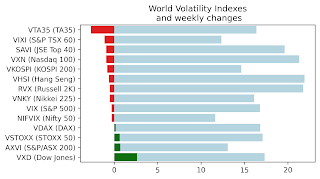If you take all available VIX futures data and create a scatterplot of daily settlement prices as a function of time to expiration you will see a curious pattern:
Yes, there are clear clusters in prices. But what do these clusters mean? The simple explanation is that the VIX term structure passes from one regime to another and there is noise around these regimes. There is a low-volatility flat, regular volatility backwardation, and high volatility contango regimes.
To estimate a model like this from historical data one would need to run some sort of HMM - honestly I am not sure how to do this. But what I did instead is to create daily fits to a basic 3-parameter model, applied k-means to the fitted parameters (n_clusters = 3)
These 3 term-structures are pretty much what I expected. The fit would probably be better in log-space, but that is something I will work on for next time. For now I want to conclude that - completely unsurprisingly three regimes are correlated with S&P returns, with low-volatility regime having high returns, and sharpe ratio, and high volatility having negative returns and low sharpe. Since 2004 we had mostly bull market, so it would be interesting to repeat this study with synthetically constructed VIX futures for 1990 and on. How would you construct synthetic VIX futures? Well - take S&P options data, calculate VIX for that expiration, and apply historical estimates for vol-of-vol premium.
Every place Ukrainian army liberated shows the same story - Russians torture, rape, and kill, soldiers and civilians, elderly and children. I wrote in February that the goal always was the genocide of Ukrainian people. Please help us protect ourselves from Russian aggression: call your government representatives to provide more military aid, more humanitarian aid, and political support to Ukraine!





No comments:
Post a Comment